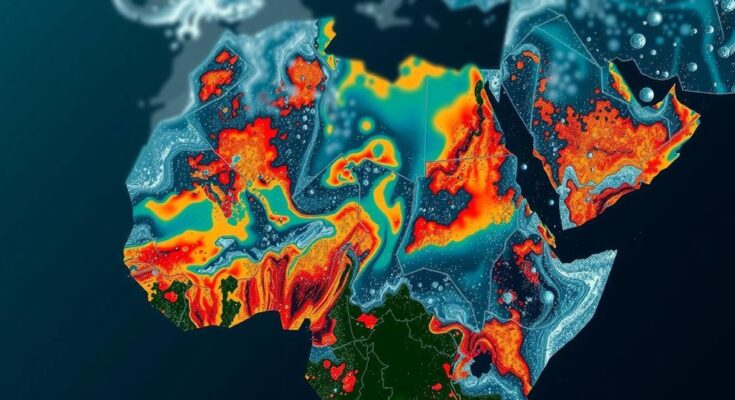Recent scientific findings indicate that climate change has intensified rainfall, leading to severe flooding in several African nations, including Cameroon, Chad, Niger, Nigeria, and Sudan. These floods have resulted in mass displacement and substantial fatalities. Projections suggest that similar extreme weather patterns could occur annually without significant reductions in global warming. The upcoming COP29 climate talks are seen as a critical opportunity for rich nations to offer financial support to the affected regions.
A recent study conducted by international scientists, as reported by World Weather Attribution (WWA), has established that human-induced climate change has exacerbated heavy rainfall leading to devastating floods in several African nations, including Cameroon, Chad, Niger, Nigeria, and Sudan. The findings indicate that global warming has heightened the intensity of seasonal rains in the Niger and Lake Chad regions by approximately 5-20% this year. Furthermore, the study projects that such severe rainfall patterns could become an annual occurrence if current warming trends continue. Izidine Pinto, a researcher at the Royal Netherlands Meteorological Institute, noted that “spells of heavy summer rainfall have become the new normal in Sudan, Nigeria, Niger, Cameroon and Chad.” The recent floods resulted in the tragic loss of approximately 1,500 lives and displaced over one million individuals in West and Central Africa, according to data from the U.N. aid agency OCHA. In addition to fatalities, the intense rainfall has overwhelmed hydrological systems, notably in Nigeria and Sudan. The WWA has warned that if global warming escalates to 2 degrees Celsius (3.6 degrees Fahrenheit), a threshold that could be reached by the 2050s, these intense downpours may occur on a near annual basis in the affected regions. The report calls for investments in early warning systems and improvements to dam infrastructure to mitigate future flooding risks. Researcher Joyce Kimutai from the Centre for Environmental Policy at Imperial College London highlighted the disparity, stating that “Africa has contributed a tiny amount of carbon emissions globally, but is being hit the hardest by extreme weather.” She emphasized the critical role of the upcoming COP29 climate talks in November, urging wealthier nations to provide “meaningful finance” to support the affected regions.
Climate change is increasingly recognized as a significant factor influencing weather patterns globally. In regions like West and Central Africa, the impacts are particularly severe, as evidenced by the recent flooding disasters. The scientific community, through efforts such as the World Weather Attribution initiative, actively analyzes the relationship between climate change and extreme weather events to better understand how anthropogenic actions exacerbate natural phenomena. With projections indicating a continuation of climate change effects, preparedness and mitigation strategies are essential for regions vulnerable to such catastrophic weather events.
In summary, the alarming findings from the World Weather Attribution report reveal a direct link between climate change and intensified rainfall leading to catastrophic floods in West and Central Africa. With the potential for such severe weather to occur annually if global warming trends persist, urgent action is needed to enhance infrastructure and support systems in these vulnerable regions. The upcoming COP29 climate talks present an important opportunity for wealthy nations to contribute significantly to mitigation efforts and support the impacted areas in addressing the challenges posed by climate change.
Original Source: kfgo.com




